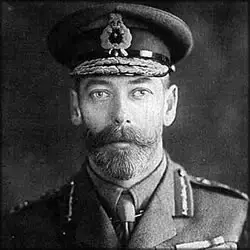The last words of King George V
George V (1865 – 1936) came to the British throne in 1910. Prior to that time he had been best known for his obsessive stamp-collecting and industrial scale shooting of pheasants and tigers. He was taken more to the hearts of the British public during WWI, when he frequently toured the front lines and stood firmly against his cousin and look-alike, the British hate-figure Kaiser Wilhelm II.
George V’s last words are widely, but incorrectly, reported as being:
Bugger Bognor!
Kings, Queens and Courtiers: Intimate portraits of The Royal House of Windsor From Its Foundations to the Present Day, Kenneth Rose, 1989.
Background to King George V’s last words
George Frederick Ernest Albert, King of Great Britain, Ireland, and the British dominions beyond the seas, and Emperor of India, more snappily known as George V, was a quiet and unassuming man. He was temperamentally unsuited to leading his nation, especially in the high-profile figurehead role that was required of him during the First World War. Nevertheless, he applied himself to the task and worked hard to become a visible and popular monarch. After the war, he changed the family name from Saxe-Coburg-Gotha to Windsor to minimise any association with his German ancestry.
He was a heavy smoker and, in 1928, he fell ill with a chest infection. He spent some time recuperating at Sir Arthur du Cros’s house in the south-coast town of Bognor and, the story goes, when he was leaving the town he was petitioned to rename it Bognor Regis as a mark of his visit. The famous ‘Bugger Bognor!” remark may or may not have been his reply but, sadly, they weren’t his dying words.
George returned to London and lived in some discomfort for a few more years, finally succumbing at Sandringham House in 1936. Another version of his final words is “How is the Empire?”, said to his secretary Clive Wigram on the day of his death. A variant of the “Bugger Bognor!” story is that he said it on his deathbed when it was suggested that he might soon be well enough to return there. His actual last words appear to have been less quotable – his physician Lord Dawson reported later that his final utterance was “God damn you”, said to his nurse when she administered a sedative. There has been much speculation that Dawson prescribed the sedative to hasten the King’s demise, so that the press would have the story for the morning newspapers.
Dawson coined a memorable line for the media with his press release during George’s final hours – “The King’s life is drawing peacefully to a close”.

